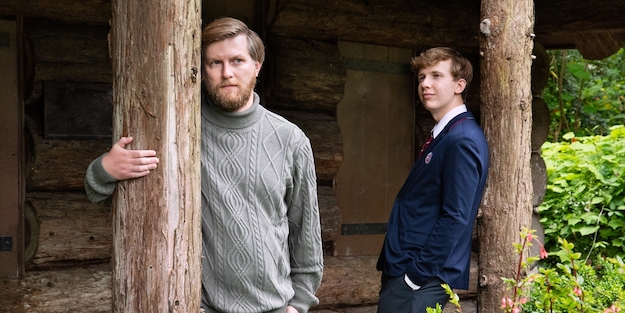
If you’ve seen Disney’s cheerful animated feature “The Sword in the Stone,” the world premiere production of “Before the Sword” at the New Conservatory Theatre Center will deepen your appreciation of the film’s source material.
Fortuitously opening on the eve of San Francisco’s biggest annual celebration of the leather community, playwright Andrew Alty’s fictionalized peek at author Terence Hansbury “T.H.” White’s creation of the landmark 1938 novel is at once a sprightly adventure play and an invitation for audiences to consider aspects of White’s life story that lean Folsom as well as wholesome.
As imagined by Alty in “Before the Sword,” White—publicly considered at least eccentric if not entirely unsavory—has lost his job as a schoolteacher and is living in woodland isolation outside a small English village in the early 20thCentury.
When Freddy, a troubled local adolescent, is kicked out of the same academy that formerly employed White, his starchy father and sensitive mother find themselves at wit’s end. They end up hiring the iconoclastic educator as the boy’s private tutor.
White’s unconventional pedagogy draws lessons from the natural world, and Freddy’s self-confidence blooms through keen observance of his professor’s beloved hawks and other forest creatures.
Taking the boy under his wing and molding him into a young man of substance and character rekindles White’s blocked creative spirit, setting his course in literary history as he begins to draft “The Sword in the Stone.”
No graphic swordplay
In the plot of the real-life White’s celebrated novel, Merlyn the magician prepares an orphan wastrel to rise to the throne and become the legendary King Arthur.
Alty’s parallel plotting of his play with White’s novel is clever and charming. As is his leverage of both stories as allegories for the mentoring of young gay man by an experienced elder.

Still, let’s make no bones about it: Audiences attending “Before the Sword” should by no means anticipate a Triple Excalibur theater experience. In his sweet natured and fleetly paced writing, Alty handles the play’s meta-textuality and implied homosexuality with a gentle hand.
With deft artistic alchemy, he’s written a piece that queer parents (well, all parents) can feel entirely comfortable taking children to (well, children 8 and up) even as it brings tears to the eyes of the most leather-hided adults.
“I wanted the themes of the play to sit very lightly on the surface,” said Alty in a recent interview. “I also didn’t want the audience to feel walloped a message.
“There are plenty of plays being done these days that are what I think of as agitational propaganda. And I think there’s a place for that. But I wanted this to pull you in like an adventure story, not any sort of lesson. The plot is like a train and once it gets going you can’t get off.”
Inspiration and interpretation
After first discovering White and the Arthurian tales through Disney’s “Sword in the Stone” as a child, Alty became a lifelong reader and admirer of the reclusive author. As a gay writer himself, Alty became fascinated with some of the ambiguous details in White’s life story. He points to Sylvia Townsend Warner’s biographical as the launch pad for his further research.
“I think,” said Alty “That some of White’s own sexuality was informed by abuse he suffered in public school and from his father. It seems likely that he was into sadomasochistic sex. He apparently shelved a novel he wrote that dealt with his sexual desires.
“You must think about how this all may have felt to someone in the 1930s. He saw a psychiatrist to try to address his feelings. Ultimately, he felt like he couldn’t conform and that’s part of why he ended up living in a sort of isolation.”
As repressed and alienated as White may have felt in his sexual life, his artistic endeavors boomed after the success of “The Sword in the Stone,” which became the first of a four book Arthurian series, known as “The Once and Future King.”
Ed Decker, NCTC founder and director of “Before the Sword,” commissioned the play in part because its themes resonate with his lifelong dedication to theater education for young people.
“At one point during the play’s development, Andrew and I had a serious talk about what aspect of this story we really wanted to focus on. And we decided that we were not so much interested in the idea of an older man falling in love with his student as the idea of mentorship.
“In the end, I think that whether you’re a writer or not, we all go through a creative process in our lives. We look around and observe ourselves and our families and gradually find who we want to make ourselves into as human beings.”
